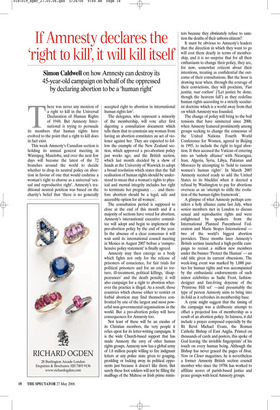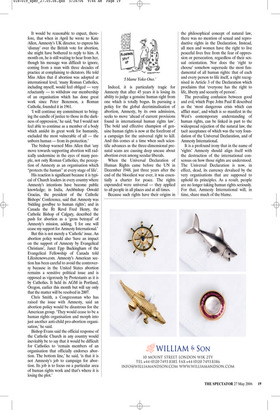If Amnesty declares the ‘right to kill’, it will kill itself
Simon Caldwell on how Amnesty can destroy its 45-year-old campaign on behalf of the oppressed by declaring abortion to be a ‘human right’ There was never any mention of a right to kill in the Universal Declaration of Human Rights of 1948. But Amnesty International is trying to persuade its members that human rights have evolved to the point that a right to kill does in fact exist.
This week Amnesty’s Canadian section is holding its annual general meeting in Winnipeg, Manitoba, and over the next few days will become the latest of the 72 branches around the world to decide whether to drop its neutral policy on abortion in favour of one that would enshrine a woman’s right to choose as a universal ‘sexual and reproductive right’. Amnesty’s traditional neutral position was based on the charity’s belief that ‘there is no generally accepted right to abortion in international human rights law’.
The delegates, who represent a minority of the membership, will vote after first digesting a consultation document which tells them that to constrain any woman from having an abortion constitutes an act of violence against her. They are expected to follow the example of the New Zealand section, which approved a pro-abortion policy just weeks ago, and the British section, which last month decided by a show of hands at the University of Warwick to adopt a broad resolution which states that the ‘full realisation of human rights should be understood to mean that a woman’s rights to physical and mental integrity includes her right to terminate her pregnancy ... and therefore abortion should be a legal, safe and accessible option for all women’.
The consultation period is supposed to close at the end of this month and if a majority of sections have voted for abortion, Amnesty’s international executive committee will adopt and begin to implement the pro-abortion policy by the end of the year. In the absence of a clear consensus it will wait until its international council meeting in Mexico in August 2007 before a ‘comprehensive policy statement’ is finally agreed.
Amnesty may then emerge as a body which fights not only for the release of prisoners of conscience, for fair trials for political prisoners and for an end to torture, ill-treatment, political killings, ‘disappearances’ and the death penalty; it will also campaign for a right to abortion wherever the practice is illegal. As a result, those countries which choose either to restrict or forbid abortion may find themselves confronted by one of the largest and most powerful non-governmental organisations in the world. But a pro-abortion policy will have consequences for Amnesty too.
Not least of these will be an exodus of its Christian members, the very people it relies upon for its letter-writing campaigns. It is the wide Church-based support that has made Amnesty the envy of other human rights groups. Amnesty now has a global army of 1.8 million people willing to fire indignant letters at any police state given to gouging, prodding or locking away its political opponents just because it doesn’t like them. But surely these foot soldiers will not be filling the mailbags of the Maltese or Irish prime minis ters because they obstinately refuse to sanction the deaths of their unborn citizens?
It must be obvious to Amnesty’s leaders that the direction in which they want to go will cost them dearly in terms of membership, and it is no surprise that for all their enthusiasm to change their policy, they are, for now, somewhat reticent about their intentions, treating as confidential the outcome of their consultations. But the hour is drawing near when, through the courage of their convictions, they will proclaim, ‘Fiat justitia, ruat coelum’ (‘Let justice be done, though the heavens fall’) as they redefine human rights according to a strictly secularist doctrine which is a world away from that on which Amnesty was founded.
The change of policy will bring to the boil tensions that have simmered since 2000, when Amnesty featured prominently among groups seeking to change the consensus of the United Nations Fourth World Conference for Women, agreed in Beijing in 1995, to include the right to legal abortion. It then accused the Vatican of entering into an ‘unholy alliance’ with Nicaragua, Iran, Algeria, Syria, Libya, Pakistan and Morocco by attempting to ‘hold to ransom women’s human rights’. In March 2005 Amnesty seemed ready to add the United States to its blacklist when it decried a refusal by Washington to pay for abortions overseas as an ‘attempt to stifle the evolution of the human rights framework’.
A glimpse of what Amnesty perhaps considers a holy alliance came last July, when senior members met in London to discuss sexual and reproductive rights and were enlightened by speakers from the International Planned Parenthood Federation and Marie Stopes International two of the world’s biggest abortion providers. Three months later Amnesty’s British section launched a high-profile campaign to recruit a million new members under the banner ‘Protect the Human’ — an odd title given its current obsessions. The week-long event was marked by 1,000 parties for human rights and was accompanied by the enthusiastic endorsements of such minor celebrities as Sadie Frost, fashiondesigner and fast-living doyenne of the ‘Primrose Hill set’ —and presumably the type of person Amnesty aims to bring into its fold as it refreshes its membership base.
A cynic might suggest that the timing of the campaign was a deliberate attempt to offset a projected loss of membership as a result of an abortion policy. In fairness, it did include a prayer composed especially by the Rt Revd Michael Evans, the Roman Catholic Bishop of East Anglia. Printed on thousands of cards and posters, this spoke of God leaving ‘the invisible fingerprints’ of his touch on every human being. Although the Bishop has never graced the pages of Heat, Now or Closer magazines, he is nevertheless a former Amnesty British section council member who since the 1970s has worked to affiliate scores of parish-based justice and peace groups with local Amnesty groups. It would be reasonable to expect, therefore, that when in April he wrote to Kate Allen, Amnesty’s UK director, to express his ‘dismay’ over the British vote for abortion, she might have bothered to reply to him. A month on, he is still waiting to hear from her, though his message was difficult to ignore, coming from a man with three decades of practice at complaining to dictators. He told Miss Allen that if abortion was adopted at international level, ‘many Roman Catholics, including myself, would feel obliged — very reluctantly — to withdraw our membership of an organisation which has done great work since Peter Benenson, a Roman Catholic, founded it in 1961.
‘I will continue my commitment to bringing the candle of justice to those in the darkness of oppression,’ he said, ‘but I would not feel able to continue as a member of a body which amidst its great work for humanity, excluded the most vulnerable of all — the unborn human — from its protection.’ The bishop warned Miss Allen that ‘any move towards supporting abortion will radically undermine in the eyes of many people, not only Roman Catholics, the perception of Amnesty as an organisation which “protects the human” at every stage of life’.
His reaction is significant because it is typical of Church leaders in every country where Amnesty’s intentions have become public knowledge; in India, Archbishop Oswald Gracias, the president of the Catholic Bishops’ Conference, said that Amnesty was ‘bidding goodbye to human rights’; and in Canada the Rt Revd Fred Henry, the Catholic Bishop of Calgary, described the push for abortion as a ‘gross betrayal’ of Amnesty’s mission, adding, ‘I for one will cease my support for Amnesty International.’ But this is not merely a ‘Catholic’ issue. An abortion policy would also ‘have an impact on the support of Amnesty by Evangelical Christians’, Janet Epp Buckingham of the Evangelical Fellowship of Canada told Lifesitenews.com. Amnesty’s American section has been careful to avoid the controversy because in the United States abortion remains a sensitive political issue and is opposed as vigorously by Protestants as it is by Catholics. It held its AGM in Portland, Oregon, earlier this month but will say only that the matter will be resolved in 2007.
Chris Smith, a Congressman who has raised the issue with Amnesty, said an abortion policy would be disastrous for the American group. ‘They would cease to be a human rights organisation and morph into just another anti-child pro-abortion organisation,’ he said.
Bishop Evans said the official response of the Catholic Church in any country would inevitably be to say that it would be difficult for Catholics to ‘remain members of an organisation that officially endorses abortion. The bottom line,’ he said, ‘is that it is not Amnesty’s job to campaign for abortion. Its job is to focus on a particular area of human rights work and that’s where it is losing the plot.’ Indeed, it is particularly tragic for Amnesty that after 45 years it is losing its ability to judge a genuine human right from one which is totally bogus. In pursuing a policy for the global decriminalisation of abortion, Amnesty, by its own admission, seeks to move ‘ahead of current provisions found in international human rights law’. The bold and effective champion of genuine human rights is now at the forefront of a campaign for the universal right to kill. And this comes at a time when such scientific advances as the three-dimensional prenatal scans are causing deep unease about abortion even among secular liberals.
When the Universal Declaration of Human Rights came before the UN in December 1948, just three years after the end of the bloodiest war ever, it was essentially a charter for peace. The rights expounded were universal — they applied to all people in all places and at all times.
Because such rights have their origins in the philosophical concept of natural law, there was no mention of sexual and reproductive rights in the Declaration. Instead, all men and women have the right to live peaceful lives free from the fear of oppression or persecution, regardless of their sexual orientation. Nor does the ‘right to choose’ somehow supersede the most fundamental of all human rights: that of each and every person to life itself, a right recognised in Article 3 of the Declaration which proclaims that ‘everyone has the right to life, liberty and security of person’.
The prevailing confusion between good and evil, which Pope John Paul II described as the ‘most dangerous crisis which can afflict man’, and which is so manifest in the West’s contemporary understanding of human rights, can be linked in part to the widespread rejection of the natural law, the tacit acceptance of which was the very foundation of the Universal Declaration, and of Amnesty International.
It is a profound irony that in the name of ‘rights’ Amnesty should align itself with the destruction of the international consensus on how those rights are understood. The Universal Declaration is now, in effect, dead, its currency devalued by the very organisations that are supposed to uphold its principles. As a result, people are no longer taking human rights seriously. For that, Amnesty International will, in time, share much of the blame.











































































































 Previous page
Previous page